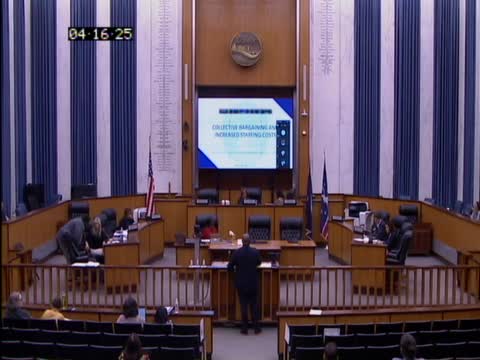Human Resources presents collective bargaining cost projections to committee
Get AI-powered insights, summaries, and transcripts
Subscribe
Summary
City Human Resources briefed the Finance and Economic Development Standing Committee on collective bargaining units, negotiated wage multipliers and projected personnel costs over the next three years; staff said a mayoral report on collective bargaining will be prepared by July 25, 2025.
Tyrone Alexander, the director of human resources, presented an overview of Richmond’s collective bargaining landscape and projected costs to the Finance and Economic Development Standing Committee on April 21, describing negotiated wage formulas, affected employee counts and nonwage implementation costs.
Alexander said the city adopted collective bargaining in October 2022 and implemented three agreements in July 2024 covering administrative and technical employees, fire and emergency services, and police. He said two additional agreements (labor and trades, and a professional union) were expected to come before council in May for ratification.
Alexander provided an account of bargaining-unit sizes and scope: roughly 75.5 percent of city employees (approximately 2,975 employees) are included in bargaining units across 23 departments, with specific counts for the major units described in the presentation. He outlined negotiated wage increases and market-adjustment pools: many units have a 3.25 percent increase programmed for fiscal years 2025, 2026 and 2027, with additional market adjustment pools in FY26–27 for certain units. For police and fire, Alexander said wages are set as a multiplier of the prior year’s average salary among nearby localities (Hanover, Chesterfield and Henrico), with multipliers of about 1.103 for FY26 and incremental increases in FY27.
On projected costs, Alexander presented multi‑year totals that included wage costs, support staff and other operating costs. He summarized a combined projection for collective bargaining-related personnel costs during the covered period totaling roughly $349,770,000 (this figure aggregated multiple bargaining units and funding sources, and included assumptions about ratification and full implementation). The presentation also listed recurring nonwage costs such as professional fees (arbitrators, attorneys) and operating costs for contract administration, safety gear, and other implementation items.
Councilmembers asked about the mayor’s statutory report requirement on collective bargaining and whether staff could meet a July 25, 2025 deadline. Alexander said staff were finalizing bargaining agreements and gathering data and expected to meet the reporting requirement by the date cited.
Councilmember Katrina Gibson asked whether the city could quantify savings from reduced turnover, vacancy reductions and lower overtime resulting from bargaining; Alexander said the city could prepare that analysis by referral to track changes in vacancy, turnover and overtime over time and estimate net effects.
Alexander and councilmembers agreed to follow up with more detailed fiscal breakdowns and to include enterprise funds and other funding sources in the schedule of impacts. No committee vote on policy changes occurred during the presentation; the item was informational and will inform upcoming budget and bargaining work.
